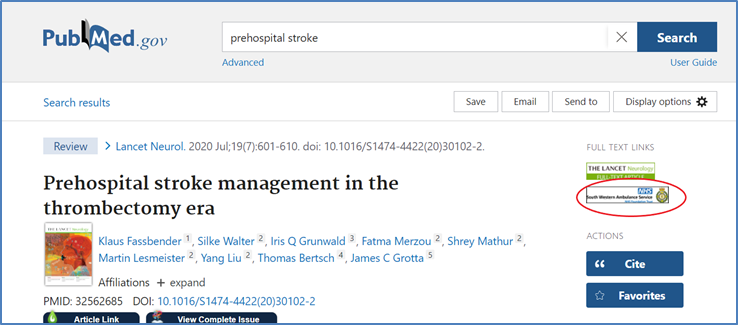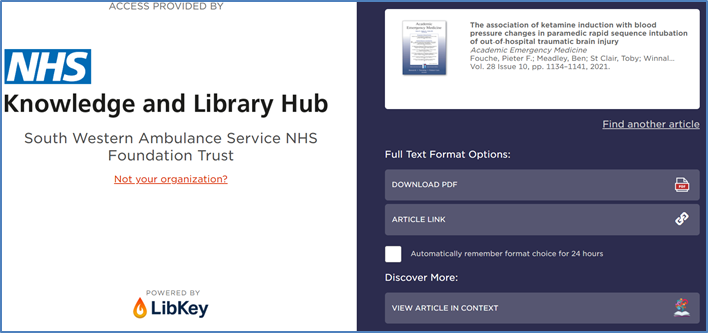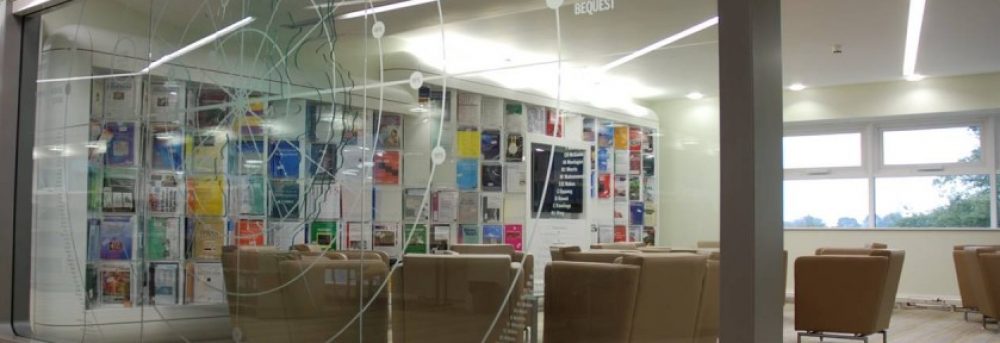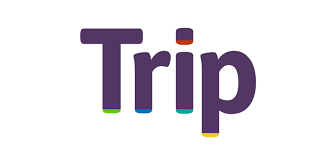How to literature search for ARTICLES ON A SUBJECT (Databases)
How to search for EVIDENCE and BEST PRACTICE on a topic (Evidence Summaries)
How to find FULLTEXT OF A SPECIFIC ARTICLE
How to find PRINT + ELECTRONIC BOOKS (SWIMS Catalogue)
How to KEEP UP-TO-DATE WITH NEW CONTENT (CURRENT AWARENESS)
How to GET ONLINE SEARCHING HELP OR LOCATE YOUR LOCAL LIBRARY
This site is maintained and hosted by the lead library for SWASFT- Discovery Library, Derriford Hospital, Plymouth.
To contact Discovery Library about this page click here but please remember that you can register with any library in the SWASFT area as detailed below.
NEW CONTENT
16/04/2024 New ebook content added
Oxford handbook of Clinical Medicine
Note you will need a local NHS OpenAthens account to access (register here)
15/04/2024 New ebook content added
A Complete Guide to the Level 4 Certificate in Education and Training
Complete Guide to the Level 5 Diploma in Education and Training
Note you will need a local NHS OpenAthens account to access (register here)
29/02/2024 New ebook content added
Oxford Professional Practice: Handbook of Quality Improvement in Healthcare
Note you will need a local NHS OpenAthens account to access (register here)
06/02/2024 New ebook content added
ABC of Neurodevelopmental Disorders
Clinical Evidence Made Easy
ECGs for Acute, Critical and Emergency Care
Effective Emails : The secret to straightforward communication at work
Integrated Care : Reflections on Change in Health Services
Patient Safety : A Case-Based Innovative Playbook for Safer Care
Problems and Pitfalls in Medical Literature : A Practical Guide for Clinicians
Psychological Safety : The key to happy, high-performing people and teams
Note you will need a local NHS OpenAthens account to access (register here)
25/01/2024 New edition Issue 103+104 of the SWASFT version of the national Prehospital Emergency Services Current Awareness Update
How to literature search for ARTICLES ON A SUBJECT

If you need an search assistance or 1-to-1 training on the use of resources please
contact Discovery Library.
You can also undertake How to Search the Literature Effectively elearning modules – you will need an NHS Athens account to access.
- Search the NHS England subscribed healthcare databases :
AMED (via Proquest Dialog)– allied and complementary medicine including palliative care
BNI (via Proquest Academic or Proquest Dialog) – nursing, midwifery and community healthcare
CINAHL (via Ebsco)– nursing and allied health~
Embase (via Ovid) – biomedical and pharmaceutical literature
Emcare (via Ovid) – nursing and allied health
HMIC (via Ovid) – healthcare management
Medline (via Ovid or via EBSCO)- biomedical, life sciences, allied health and pre-clinical sciences literature
PsycINFO (via Proquest Academic or Proquest Dialog) – psychological, social, behavioral sciences.
Social Policy and Practice (via Ovid)- health and social care
To access the NHS subscribed databases you will need an NHS Athens account.
- Search Cochrane Library
Collection of databases incl:
-Cochrane Database of Systematic Reviews
-Cochrane Central Register of Controlled Trials (CENTRAL)
–Cochrane Clinical Answers
that can be searched simultaneously and contain different types of high-quality, independent evidence to inform healthcare decision-making

- Search PubMed via SWASFT link
Free resource which contains more than 33 million citations and abstracts of biomedical literature from MEDLINE, life science journals, and online books.
The above link includes a local organisation logo on the right-hand side of each record. Clicking the logo will check article availability or offer a request form.
To access the content linked you will need an NHS Athens account.

- Search NHS Library and Knowledge Hub (Guide)
Whilst it is advisable to search the databases above for more detailed and systematic searches, the NHS Knowledge and Library Hub can be used for more simple searches to find a couple of papers on a simple topic.
To access content on the Library and Knowledge Hub you will need an NHS Athens account.
How to search for EVIDENCE and BEST PRACTICE on a topic
A range of evidence-based and other resources available to help inform patient care or support your study including:
BMJ Best Practice- (Help and training resources)
Evidence-based research, guidelines and expert opinion offering step-by-step guidance on diagnosis, prognosis, treatment and prevention.
On 1st access you’ll be asked to create personal account to download free App**
***Note you will need a local NHS Athens account (register here).
ClinicalKey–
Clinical insight search tool which also gives access to over 1100 electronic books and 500 journals and other fulltext resources
Note you will need a local NHS Athens account (register here)
Clinical Knowledge Summaries (provided by NICE)-
Summaries of the current evidence base & practical guidance on best practice for >300 primary care presentations and regular updates to all topics
Trip Pro Database
clinical search tool designed to allow health professionals to rapidly identify the highest quality clinical evidence for clinical practice.
How to find FULLTEXT OF A SPECIFIC ARTICLE
To access articles you will need a NHS Athens account.
TO SEARCH FOR AVAILABILITY OF ARTICLES USE THE FOLLOWING OPTIONS:
- The ARTICLE TITLE via the Knowledge and Library Hub (Guide)
If you have the article title please copy and paste into the main search box of the hub.
If the title is a short title using common healthcare terms, then you might want to add the Author name and/or Journal title to the search to specify your chosen article.

- The DIGITAL OBJECT IDENTIFIER (DOI) or PUBMED ID (PMID) via LibKey
– A Digital Object Identifier (DOI) is a string of numbers, letters and symbols used to permanently identify an article or document and link to it on the web.
It is usually in the format:
https://doi.org/10.1038/s41586-022-05043-y
The bit in italics which starts all DOIs can be ignored- please copy and paste the rest of your specific into the search box.
– A PubMed identifier (PMID) is a unique value assigned to each PubMed record usually 8 digits long

- The JOURNAL TITLE using Browzine
The search only includes journals for which organisation has a subscription.
If a journal is embargoed the embargoed article will still be listed but when you click to access content you will receive a article request form rather than the fulltext.

- BROWSER EXTENSION to check all scholarly pages for SWASFT access via Nomad
You will need to download the browser extension to browsers utilised on all devices you wish to use it on
Enter South Western Ambulance as organisation when asked.

Selected Prehospital and Emergency Medicine journals below
| Journal | Coverage | Notes |
| Academic Emergency Medicine | 1997- | |
| Air Medical Journal | 2007- | |
| American Journal of Emergency Medicine | 2007- | |
| Annals of Emergency Medicine | 2007- | |
| BMJ | 1840- | |
| British Journal of Healthcare Assistants | 2018- | |
| Clinical Teacher | 2004- | |
| Disaster & Military Medicine | 2015- | |
| Emergency Medicine Australasia | 2005- | |
| Emergency Medicine Clinics of North America | 2007- | |
| Emergency Medicine Journal (EMJ) | 1984- | |
| Health Services Research | 2002- | |
| Injury | 2007- | |
| International Paramedic Practice | 2018- | |
| Journal of Emergency Medicine | 2007- | |
| Journal of Paramedic Practice (online) | 2014- | |
| Journal of Paramedic Practice (print) | 2009- | If you need a pre-2014 article from JPP please make an article request and we will scan and send copy (within Copyright limits). |
| Prehospital Emergency Care | 1997- | |
| Resuscitation | 2007- | |
| Visual Journal of Emergency Medicine | 2015- |
How to find PRINT + ELECTRONIC BOOKS

This is a regional NHS catalogue, so you need to restrict search to location.
Ebooks– restrict by location:
-South Western Ambulance Service NHS Foundation Trust SWASFT
You will need an NHS Athens login to to access ebooks.
**List of Prehospital practice, research & education ebooks available to SWASFT **
COVID-19 update – print book access
SWASFT staff and placement students are able to visit and join any NHS library in the SWASFT area to borrow print books held locally.
At present a number of libraries across the area have moved to remote-only services or reduced staffing so before visiting please contact your local library using the
‘Find your local health library’ map at the bottom of the SWIMS catalogue main page.
Email library.mailbox@nhs.net if you are having problems locating print content.
You can renew your books here (if you have not already made a pin number for your library account follow the instructions on screen).
If we don’t have the book you require you can consider making a book request.
(Service for registered borrowers, undertaking NHS work. Registration forms are available here).
How to KEEP UP-TO-DATE WITH NEW CONTENT (CURRENT AWARENESS)
You may find the following useful for keeping up-to-date.
- Prehospital Emergency Services Current Awareness Update (locally edited SWASFT version with relevant fulltext links)
Provides a digest of information supporting evidence based practice in pre-hospital, ambulance and emergency services incl. recent research, news and policy items, and relevant reports. Update is commissioned by the National Ambulance Research Steering Group.
- Current Awareness bulletins created by the Library & Knowledge Service for NHS Ambulance Services in England
–Emergency Preparedness, Resilience and Response
–Further Research Needed
-Telephone Support in Prehospital Care
- Pinboards for latest prehospital and paramedicine research created by North West Ambulance Service Librarian, Matt Holland. Includes topics such as
- Feeds for the major journals in prehospital and emergency care
How to GET ONLINE SEARCHING HELP OR LOCATE YOUR LOCAL LIBRARY
Electronic resources are available to all SWASFT staff and students irrespective of location, and details of how to access are listed in the other sections on this page
Please email library.mailbox@nhs.net to request electronic resource training.
Local libraries
SWASFT staff/placement students can access the physical resources and services at their local NHS library.
We advise phoning ahead before your first visit to check staffed hours and access arrangements- each library will have own method of entry system.






